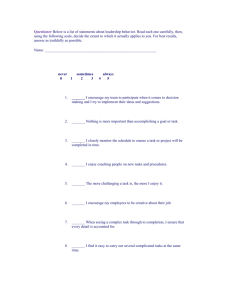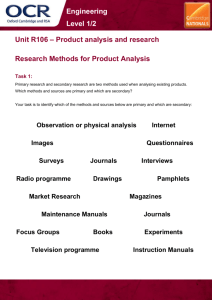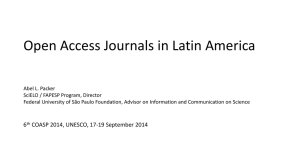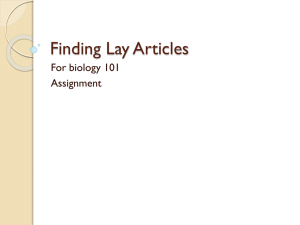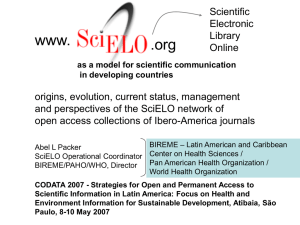View/Open
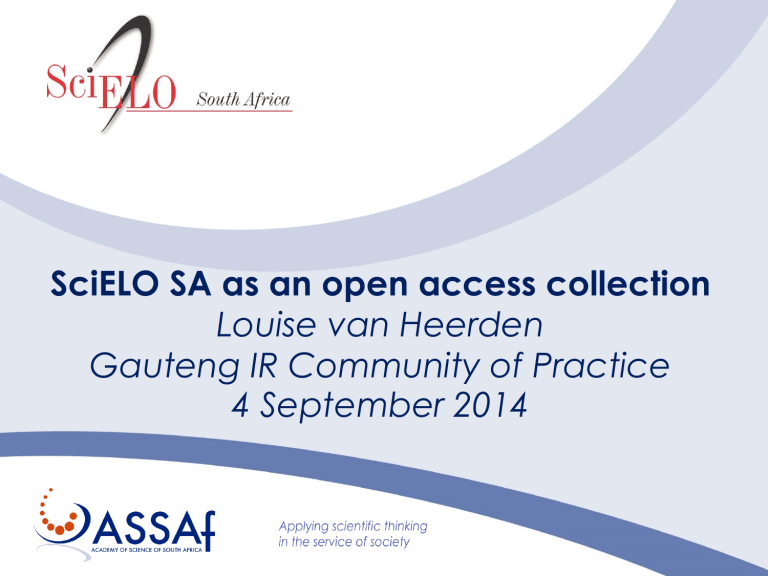
SciELO SA as an open access collection
Louise van Heerden
Gauteng IR Community of Practice
4 September 2014
WHY?
WHO?
-
-
-
-
-
-
-
WHAT?
Quality
Visibility
Why SciELO?
SciELO SA
Usage
Indexability
Developments
ACTION?
HOW VISIBLE IS SOUTH AFRICA’S SCHOLARLY
RESEARCH?
The 2006 Academy of Science of South Africa Report on Scholarly Publishing revealed that:
Papers published in 60 SA journals received not even 1 citation in any of the 9 000 WoS (TR) journals over a 15-year period
About 75% of SA scholarly research is not internationally visible or accessible
• Of the 270+ South African scholarly journals accredited by DHET, only ± 70 are indexed in the Web of Science (Thomson Reuter) (formerly known as
ISI) academic citation index
• Journals from Africa & the Middle East comprise 1% of the Web of Science
• Furthermore, articles (journals) published by commercial publishers are not available to researchers who cannot pay for the subscription fees which renders them invisible to the majority of South Africans
- Journals that are mainly print based are not accessible via the Web
- Quality of the content was very low at the time – not adhering to international standards
SO ARE SOUTH AFRICAN RESEARCHERS
WORKING IN VAIN?
RESPONSE FROM GOVERNMENT
• Department of Science & Technology (DST): The creation of an open access collection to promote South African scholarly research through
enhanced visibility of and easier access to South African research, leading to higher citation rates and greater collaboration.
• Department of Higher Education & Training (DHET): The development of a
National Digital Library including the SciELO SA Collection of SA OA journals
DST & DHET approached the Academy of Science of South Africa (ASSAf) for help
THE ACADEMY OF SCIENCE OF SOUTH AFRICA
(ASSAf)
The Academy of Science of South Africa (ASSAf) receives funding from the
Department of Science and Technology, along with the NRF, CSIR, HSRC and the SA National Space Agency.
(Universities in turn receive funding from DHET)
ASSAf’s Mission:
Using science for the benefit of society
ASSAf EVIDENCE BASED REPORTS
Scholarly Publishing Programme (SPP)
•
-
The dissemination of the results of scientific research has always been a crucial part of the production process of new knowledge and innovation.
Within the countries’ National System of Innovation (NSI) ASSAf’s Scholarly
Publishing Programme has been mandated to focus on the
Enhancement of original, peer-reviewed publications produced by researchers in the public sector, as well as improved:
Quality
Quantity
Worldwide visibility
Worldwide accessibility of South African publications
ASSAf
EVIDENCE-BASED
REPORTS f or decision making
SPP
(Scholarly Publishing
Programme)
REPORTS e.g.
Report on Research
Publishing in SA
Book Study
Online Scientific
Writing
Review
National Scholarly
Editors’ Forum
Peer Review Panels SciELO SA
1 st – QUALITY
Towards a new quality assurance system in SA
• In 2009 DHET approached ASSAf to undertake the quality evaluation of the
content of South African journals
• ASSAf is facilitating the external peer reviewing of SA journals
• Aim: To establish their quality and their role in the nation’s knowledge capital and to provide journals with advice on how to improve their journals
Improving the quality of South African journals
PEER-REVIEWING OF SA JOURNALS
– +/- 270 SA journals divided into broad subject (discipline) groups
– ASSAf has appointed panels and reviewers (from the ASSAf membership or other experts in the field)
– Formulated process guidelines and editor questionnaires
– Published 6 Reports: Social Sciences; Agriculture; Theology; Health; and Law
– Rolling out the 8 groups as by end-2014
2 nd VISIBILITY
Increasing visibility of SA scholarly research
• Based on the Recommendations of the ASSAf Report on a Strategic
Approach to Research Publishing in South Africa DST decided on the creation of an open access collection to improve the visibility of SA publications both locally and internationally
• The collection would include SA journals recommended by the ASSAf
Peer Review Panels for inclusion in the collection
• The creation of a an open access SA collection is a service to the
South African research community towards the development of a knowledge economy and new innovation in South Africa
2 nd VISIBILITY
Increasing visibility of SA scholarly research
• ASSAf selected the SciELO publishing model
• In 2009 the SciELO SA open access platform was established
• Currently: 45 titles in the collection
• The journals that are peer-reviewed by ASSAf and indicate proven quality (peer review, international indexing) are invited to join the
SciELO SA collection
• Aim: to invite ± 180 titles out of 270 SA journal titles to join the collection
WHAT IS SciELO (Scientific Electronic Library
Online) ?
• A digital library of open access journals
• Portal to all the SciELO articles
• A cooperative electronic publishing model aimed at developing countries
• Originally from Brazil, currently in 12 countries with
3 more in development
WHY SciELO (Scientific Electronic Library Online) ?
Open access
South African research becomes searchable through the SciELO network portal which feeds into the Web of Knowledge portal
Exchange of metadata with other international databases
Designed for the needs of developing countries
The SciELO Network focuses on promoting the scientific publications from countries in the South, whereas the well-established ‘Web of
Science’ has until recently been focused mainly on the scientific publications of developed countries in the North.
ORIGIN OF THE SciELO INDEX
Scientific American, v.237, p.76-83. 1995
Research from developing countries are being excluded from the
WoS/TR (JCR) indexing and citation system
Few journals of developing countries are read in or outside their country
SciELO – in the Open Access Movement
SciELO introduces
Latin-American journals into the
Open Access
Movement
Source: Folder of International Seminar on Open Acces for Developing Countries, by BIREME
SciELO – OPEN ACCESS MODE
SciELO model is different from others like: PubMed Central, BioMED Central, High
Wire Press, etc. because those are centralized collections
Most SciELO journals are predominately funded by public resources
90% of SciELO journals are published by universities, research centers, scientific societies, and other non-commercial associations
10% are published by profit corporations
SciELO collections are managed, funded, promoted and operated by national councils of science and technology, ministries and academic organizations
So in line then with the mandate of the
Academy of Science of South Africa to apply scientific thinking in the service of society one of these “Service to Society” projects is the creation of an open access full-text database of prestigious academic South African journals to improve access & visibility
• Managed by the Academy of Science of SA
• Mainly funded by the Department of Science & Technology
• Partially funded and endorsed by the Department of Higher Education
& Training
• Only high quality journal are included (ASSAf Peer Review Panels)
• Strengthens the scholarly journal evaluation and accreditation systems in
South Africa
www.scielo.org.za
THE SOUTH AFRICAN JOURNAL OF SCIENCE
(SAJS) – AS EXAMPLE
SAJS USAGE STATISTICS – AS EXAMPLE
3 rd ACCESS SciELO Growth
SciELO SA
Visits
Visits per day
Usage increase
SciELO SA
Titles
Issues
Articles
August 2013
50 358
August 2014
68 388
1 624
Usage increase 26 %
2 206
August 2014
41 titles
539 issues
9 009 articles
INTERNATIONAL USAGE OF
THE SCIELO SA RESEARCH
30 000
25 000 24 485
CONTINENTS VISITING THE
SCIELO SA SITE (AUGUST 2014)
20 000
15 000
12 651
11 519
12 126
10 000
5 000
0
Africa Europe Americas Asia
1 687
740
Oceania Other
Continents
SITE VISITS
According to Google Analytics, the SciELO SA site was visited:
68 388 times during August 2014
(± 2206 x p/d)
And ± 640 000 times during the last year
MOST VISITED JOURNAL TITLES
SAJS, SAMJ, SAJE & WSA
INCREASE IN VISIBILITY OF PRINT-ONLY
JOURNALS
Journal title
Articles viewed
From 2010 to date
South African Orthopaedic Journal
Kronos: Southern African Histories
Psychology in Society (PINS)
136 951
60 254
32 678
4 th INDEXABILITY –
MAXIMIZING LINKS
Scholar
CrossRef
WoS
SCOPUS
Article
SciELO
DOAJ
Open
DOAR
AGRIS
FAO
The creation of optimal links from SciELO Journals to the main international databases increases the visibility and citations of these journals on national and international levels
PUBMED
MEDLINE
SciELO
LILACS
World
Cat
SciELO IS WELL OPTIMISED FOR SEARCH
ENGINES – AN EXAMPLE
IMPORTANT DEVELOPMENTS TO ENSURE
CONTINUED QUALITY ASSURANCE, VISIBILITY AND
ACCESSIBILITY FOR SOUTH AFRICAN JOURNALS
• SciELO SA collection certified in April 2013
• Included on the Web of Knowledge platform
• Have a signed a Memorandum of Agreement with DHET to quality peer review
ALL South African journals
• Proposed change in the DHET policy for the automatic accreditation of SciELO
SA journals for subsidy purposes. Waiting for final notification from Parliament for
2015 publications
ACTION
• Encourage researchers to publish in open access journals
• Encourage editors to join ASSAf’s National Editor’s Forum
Louise van Heerden, Operations Manager: SciELO SA
Susan Veldsman, Director: Scholarly Publishing (ASSAf)
From 1 October: Ina Smith, Planning Manager: SciELO SA www.assaf.org.za

